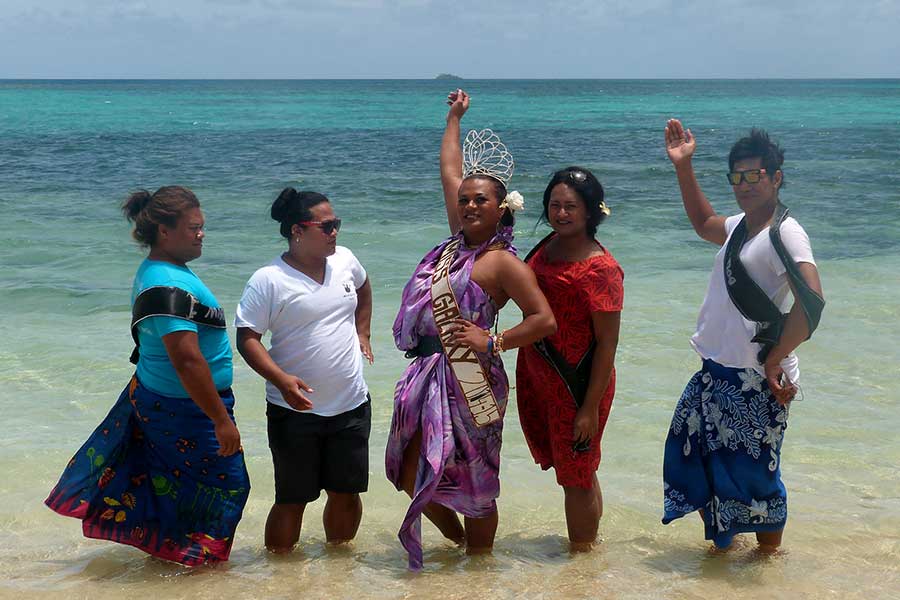The Pride Program at this year’s Philadelphia Asian American Film Festival, held Nov. 8-18 at various venues in the city, offers two documentaries, a feature film and six shorts that showcase GLBTQ life in Asia and Asian America.
The engrossing documentary “Call Her Ganda” (Nov. 9, 3:30 p.m., Lightbox Film Center) will generate righteous anger as it recounts the 2014 murder of Filipino transwoman Jennifer Laude by U.S. Marine Scott Pemberton. Director PJ Raval examines the human-rights abuses and media frenzy as well as the impact this case had; it ignited trans-community activism and a demand for justice. Trans journalist Meredith Talusan covers the trial in the film, the transphobic responses to the case and a system designed to protect the Americans. Raval digresses from Laude’s story at times with a history of Philippine-American relations and U.S. imperialism — but the film remains powerful nonetheless.
In the feature “For Izzy” (Nov. 9, 5:45 p.m., Lightbox Film Center), Dede (Michelle Ang) is a hot mess. She can’t get her Oxycontin refilled, has lost her photojournalism job and was jilted by her girlfriend two weeks before their wedding. Devastated, this self-described “high-functioning addict” wants a fresh start and moves in with her patient mother, Anna (Elizabeth Sung). But Anna worries about her daughter’s bad decisions. While there is tension between them, Anna soon becomes enamored with their neighbor, Peter (Jim Lau), who lives with his autistic daughter, Laura (Jennifer Soo). When Dede and Laura become friends — they bond over taking photos and shooting videos — things are great. Unfortunately, when the girls go out to a park one day, a situation develops that impacts everyone. Writer-director Alex Chu includes some vibrant, animated vignettes and uses direct-address interviews to allow each of the main characters to recount their lives (and their sides of the story). As the characters work through their interpersonal challenges, “For Izzy” becomes a fresh, funky, heartfelt film. Chu, a Wharton alumnus, is expected to attend the screening.
“Leitis in Waiting” (Nov. 17, 6:05 p.m., Asian Arts Initiative) is an eye-opening documentary by married couple Dean Hamer and Joe Wilson about leitis, the transgender women in the Pacific Island kingdom of Tongo. Expanded from Hamer and Wilson’s 2017 short “Lady Eva,” the film explores how leitis, along with Joey Joleen Mataele, Eva and Miss Fatima, among others, have suffered bullying, abuse, discrimination and violence — often being kicked out of their homes — and because they are queer. They have since organized and become activists fighting for human rights in a traditional culture where an evangelical pastor argues against equal rights and same-sex marriage. The interviews with the leitis are inspiring, as is the footage from the 2016 Miss Galaxy Pageant, where Eva does a mean lip-sync to Tina Turner. What emerges from this film is the courage, dignity and pride the leitis have and that they share with their supporters, which include members of the Tongan royal family.
The festival is offering a free shorts program called “Intergenerational and Overseas Perspectives on Queer Identity” (Nov. 18, 11 a.m., Asian Arts Initiative). The lineup includes a half-dozen films on family, coming out and discrimination.
The program opens with “Hoài (Ongoing/Memory)” by Quyen Nguyen Le, which concerns a young Vietnamese woman, Hoài (Ngoc Ahn Hà), who is moving out of her activist girlfriend Viv’s (Sumiko Braun) apartment and back in with her karaoke-loving father (Ken Lê). This poignant, multilayered drama resonates as Hoài’s emotions about loss and home come to a head.
“Salamagan,” by Elisa Oh, has the closeted Filipino Ana (Jiavani Linayao) enlisting her girlfriend Gabi’s (Alyssa Ariel Perez) help in cleaning out her hoarding Auntie Belicia’s (Joi Orbe Brown) apartment. While Ana’s religious mother, Marline (Olga Nativida), is pleased with Gabi at first, Marline is none too happy when she spies the women kissing. Moreover, Ana and Gabi fight about Ana’s fear of coming out. “Salamagan” does not traverse new territory, but it has a winning, comic style.

Likewise, “Uninvited,” by Seung Yeob Lee, is an engaging short about the closeted Jungho (Sum Lee), whose mother (Keunyoung Kim) pays an unexpected visit to his apartment in Seoul. Jungho’s boyfriend, Jae-ik (Jinseung Moon), disappears just in time as Jungho’s mother criticizes her son about his dirty dishes and his hair, while also nagging him about dating. When she starts to notice clues of a roommate, Jungho’s mom puts some pieces together. How mother and son try to broach — or avoid — the topic of Jungho’s sexuality is what makes this bittersweet short so touching.
The weakest film in the program is the Taiwanese entry “Straighten Out,” by Jessie Chang. Sheng (Chic-Hsuan Tang) is recovering from a fainting spell and senses something is wrong. What he discovers is a bit sinister and shows how homosexuality is not accepted among religious families. “Straighten Out” makes an important point, but Chang’s film is too slow and subtle. It should have had greater impact.
“Rani,” by Hammad Rizvi, is a satisfying story about the title character (Kami Sid), a transgender Pakistani woman who finds a baby and wants to care for her. Rani’s situation, however, is complicated not only by poverty, but also the transphobia she encounters both verbally and physically in the streets of her town. “Rani” sheds light on a marginalized community and provides a hopeful message.
Rounding out the program (and unavailable for preview) is “Hudson,” by Shae Xu, about a divorced woman who needs to tell her son that her roommate is, in fact, her lover. n
